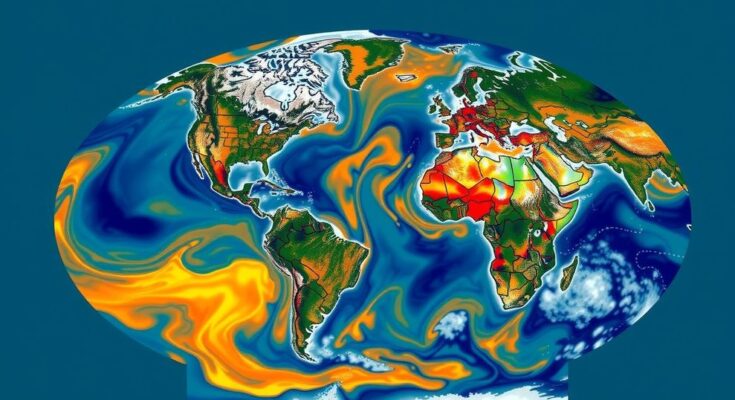Key climate news includes a report highlighting that only 2.8% of the world’s oceans are effectively protected, raising concerns ahead of the UN Biodiversity Conference. Former President Trump is criticized for politicizing disaster aid. Research links human-induced climate change to deadly floods in Nepal. Google plans to use nuclear energy for its data centers. A survey reflects high climate anxiety among youth across political spectrums. Meteorologist John Morales expressed emotional frustration over climate inaction during coverage of Hurricane Milton.
In this weekly overview of climate-related news from October 14 to 18, 2024, significant reports and analyses shed light on pressing issues affecting our environment and society. A report indicates that only 2.8% of the world’s oceans are “effectively” protected, falling far short of the commitment made by governments to conserve 30% of marine and coastal areas by 2030. This reveals a concerning gap in global marine conservation efforts leading up to the upcoming UN Biodiversity Conference. In political discourse, it has come to light that former President Trump initially denied disaster aid to blue states affected by wildfires and hurricanes, allegedly influenced by political affiliations of the states affected. This has raised concerns regarding the politicization of disaster assistance in the face of climate disasters, particularly with lessons from events like Hurricane Maria and Hurricane Michael. Moreover, a recent study reveals that intensified rainfall in Nepal, which resulted in catastrophic flooding and loss of life, can be attributed to human-induced climate change. The analysis suggests that such extreme weather events are becoming significantly more frequent due to rising global temperatures. In the realm of energy production, Google has embarked on a groundbreaking initiative to construct small modular nuclear reactors (SMRs) to power its data centers, marking the first deal of its kind by a tech company. This decision comes amid rising emissions and energy demands. Furthermore, the emotional distress linked to climate change is notably high among American youth across political lines, with a recent survey indicating a high level of anxiety regarding climate impacts. An overwhelming majority expresses significant concern over the government’s response to climate-related changes, indicating a growing demand for action. Finally, a heartfelt moment captured on air involved meteorologist John Morales, who expressed his deep frustration over the inaction on climate change while covering Hurricane Milton, which intensified alarmingly fast amidst these ongoing concerns.
The current climate crisis is characterized by alarming data and trends that reveal a significant lag in global conservation efforts, particularly in marine environments. The commitment made by nations under the Kunming-Montreal Global Biodiversity Framework aims to protect biodiversity but is failing to yield effective results. Additionally, political factors appear to influence disaster relief efforts and highlight potential inequalities in governmental support. Climate-induced weather events, such as the floods in Nepal, serve as systematic reminders of the increasing severity of climate change. The energy sector is simultaneously exploring innovative solutions to tackle rising consumption and emissions, exemplified by Google’s shift towards nuclear energy. Surveys indicating widespread climate anxiety among the youth also demand immediate action and reflect the broader societal implications of climate inaction. This background sets the stage for understanding the urgency and importance of addressing climate-related news and its multifaceted impact on ecosystems, government policy, and societal well-being.
In summary, the highlights from the week of October 14-18, 2024 reveal critical challenges facing global climates, such as insufficient marine protection, politicization of disaster assistance, and escalating weather-related disasters exacerbated by climate change. Innovative corporate strategies, like Google’s nuclear initiative, demonstrate a potential avenue toward sustainability while highlighting the urgent demand from younger generations for meaningful climate action. Collectively, these narratives underscore the pressing need for cohesive and comprehensive strategies to mitigate the impacts of climate change and emphasize the role of various stakeholders in achieving a sustainable future.
Original Source: earth.org




